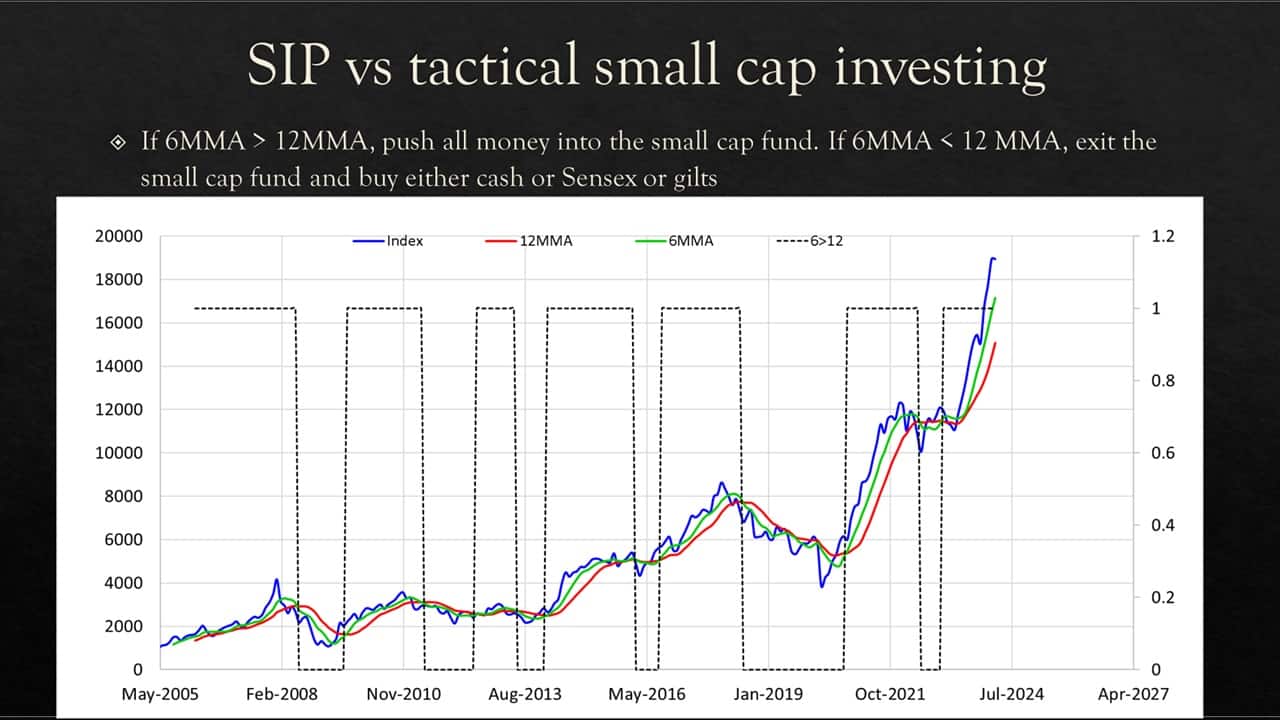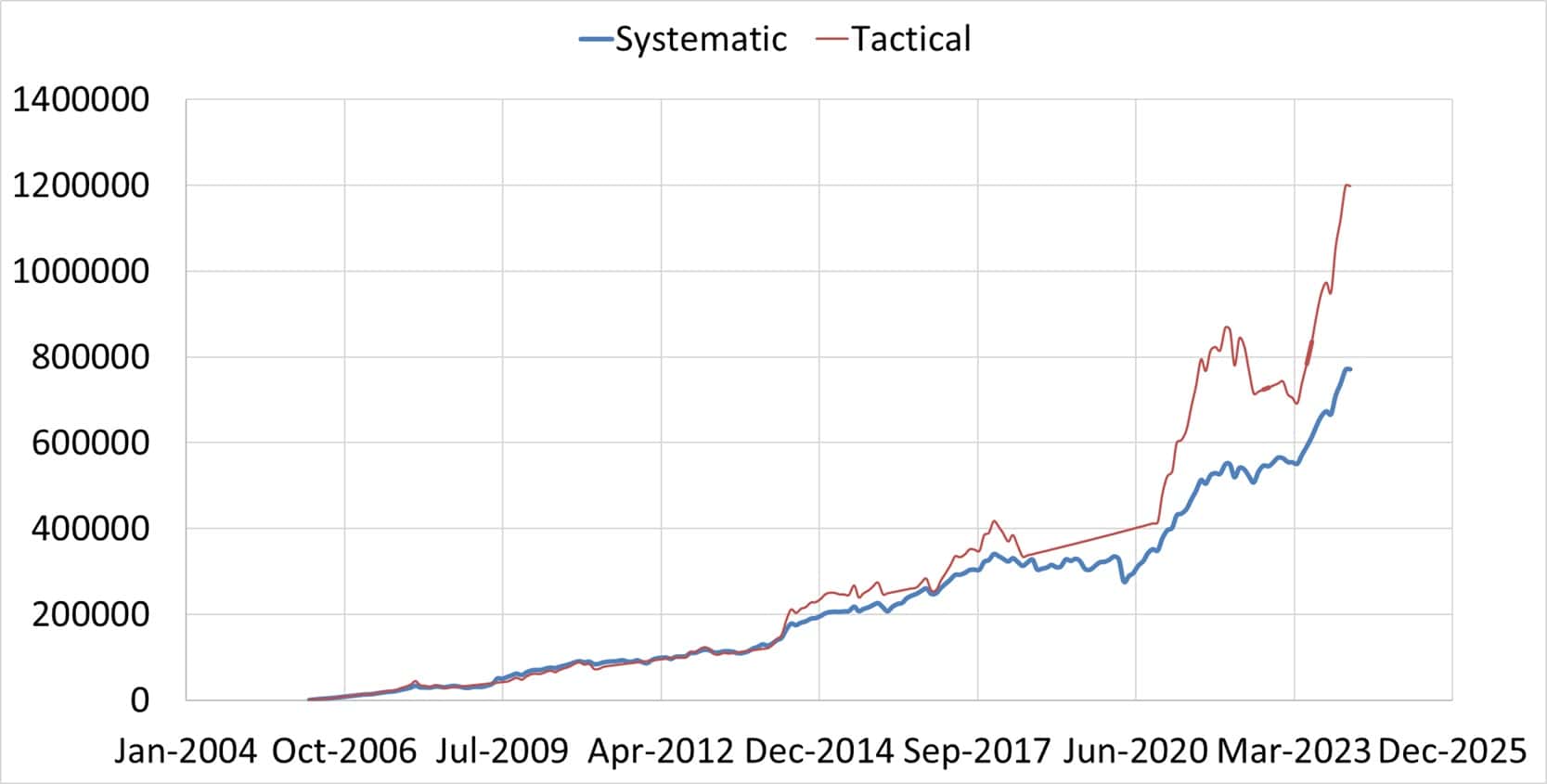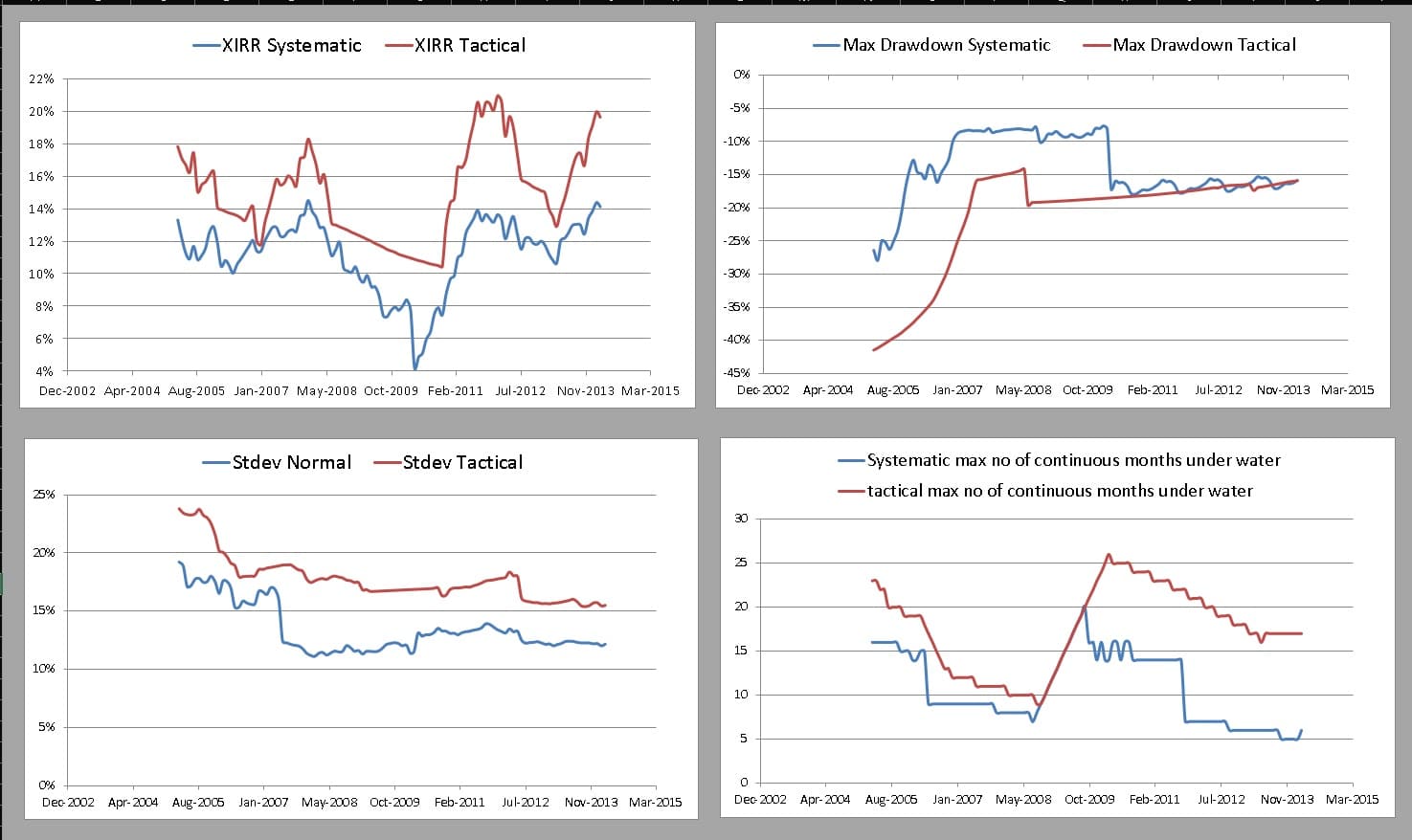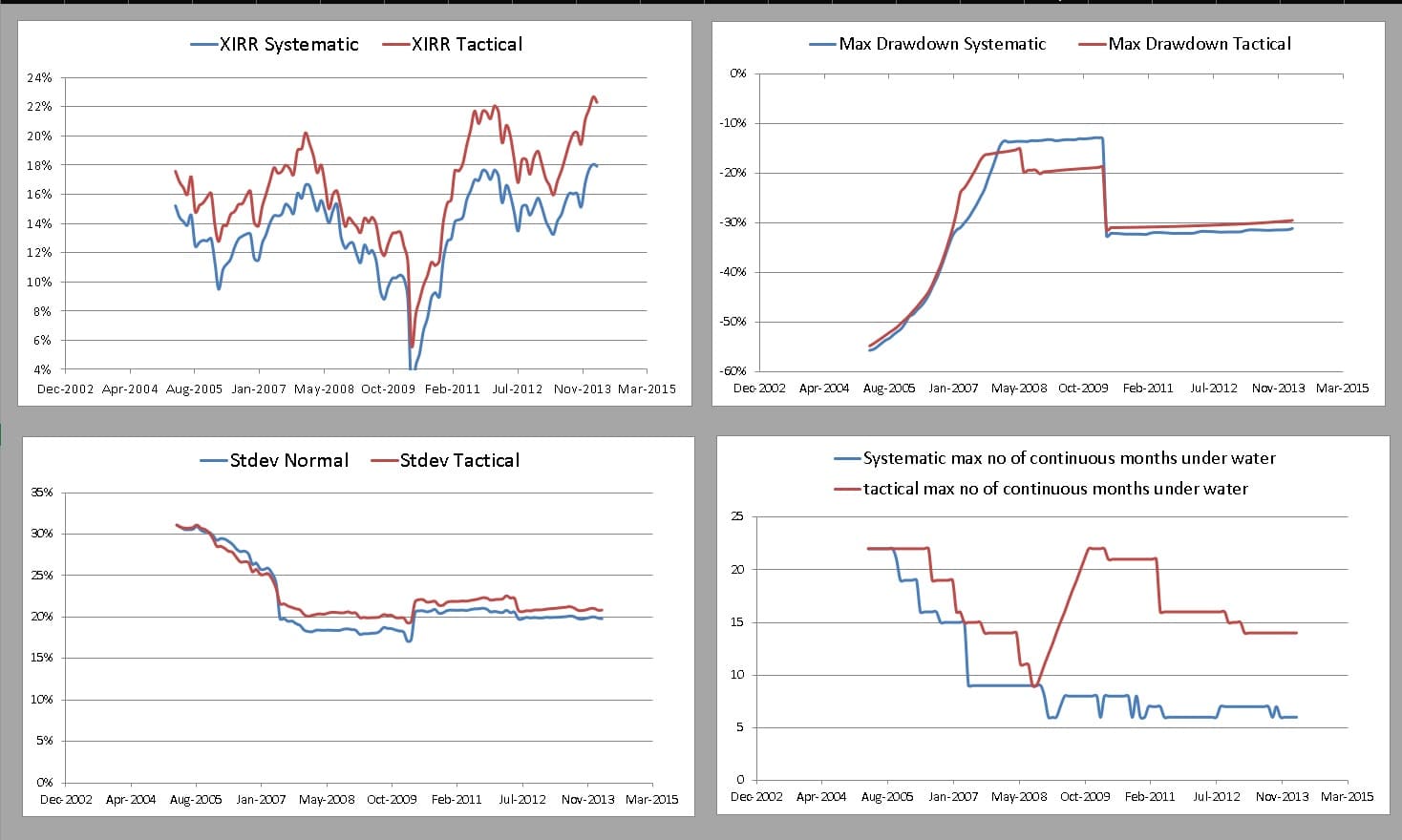We discuss a tactical entry and exit strategy for small cap mutual funds. This is the second such article. In the first part, we discussed a strategy based on the ratio of the small cap index to Nifty 50. This had a lower risk than a systematic investment in a small cap instrument and a better risk-adjusted return (return per unit risk taken). See: How to reduce the risk of investing in a small cap mutual fund.
In this article, we shall discuss the use of double-moving averages. This has a higher risk than a systematic investment in a small cap instrument with a potential for higher reward. Even at this stage, it should be obvious that the ratio-based approach is far superior, but for what it is worth, Let us look at the data. This study extends a previous report: Do not use SIPs for Small Cap Mutual Funds. Try this instead!
Before we proceed, several warnings, disclaimers and caveats should be disclosed. Unless you appreciate these, please do not proceed further.
- The entry and exit signal chosen (explained below) is arbitrary and based on past data, which is not too long (only since April 2005). The same criterion may or may not work in future. Similar to metrics like PE and PB, this will change as market history is added.
- A backtest may look wonderful today, but that does not guarantee it will work in future. See, for example, A risk in market timing that 122 years of backtesting failed to reveal! There is no guarantee that it will work in future.
- This is especially true of most Indian indices, particularly small cap indices, where the historical data is quite short, and the actual traded history is often even shorter.
- Anyone who uses the ideas described here or in our tactical asset allocation archive of articles does so at their own risk. Freefincal or this author/editor is not responsible or liable for any gains or losses that may result.
- Results shown in backtests do not factor in future market movements, human emotions, taxation and exit loads. All these would impact the outcome of market timing.
Shown below is the NAV (blue), the six-month moving average (green), the twelve-month moving average(red) and the dotted line, which is equal to “1” when the green line is above the red line (6MMA > 12MMA) and “0” if 6MMA < 12MMA.

- Systematic strategy: Normal SIP in a small cap fund (index in this study)
- Tactical strategy with double moving averages: If 6MMA > 12MMA, push all money into the small cap fund. If 6MMA < 12 MMA, exit the small cap fund and buy cash (“yielding” about 6% yearly), Sensex/Nifty, or gilts (three different options). In this case, we will only consider cash and Nifty. Taxes and exit loads have not been considered throughout.
There are some previous studies with this double MMA model. Also see A tool for tactical buying and selling using moving averages.
This is a single 18Y run comparing the portfolio growth of the double MMA method vs systematic investment in a small cap index. Notice the tactical approach has higher volatility.

We can get further insights if we run the analysis for ten years. However, please note that the data (108 10Y runs) is still limited. So, this should not be considered as a probability of success.
Double-moving average study with cash

- Top left panel: the XIRR. The tactical strategy has done quite well for the period studied, but the return spread is at least as much as the tactical approach.
- Top right panel: The portfolio’s maximum drawdown (max fall from peak) is shown (the less negative, the better). The tactical strategy has a higher drawdown. That is a higher risk.
- Bottom left panel: The standard deviation or volatility (lower the better). The tactical approach has higher volatility.
- Bottom right panel: the maximum number of months the portfolio was below its peak or underwater (lower the better). The tactical strategy takes a longer time to recover.
Double-moving average study with Nifty (instead of cash)

With Nifty (instead of cash), reward and risk (drawdown and volatility ) have decreased.
In summary, the tactical entry and exit strategy for small cap MFs using the ratio of the small cap index to Nifty 50 appears superior to the double-moving average-based strategy.
Explore our full archive of tactical asset allocation studies.
Do share this article with your friends using the buttons below.
 Enjoy massive discounts on our courses, robo-advisory tool and exclusive investor circle!
Enjoy massive discounts on our courses, robo-advisory tool and exclusive investor circle!  & join our community of 5000+ users!
& join our community of 5000+ users!
Use our Robo-advisory Tool for a start-to-finish financial plan! ⇐ More than 1,000 investors and advisors use this!
New Tool! => Track your mutual funds and stock investments with this Google Sheet!



Podcast: Let’s Get RICH With PATTU! Every single Indian CAN grow their wealth!

You can watch podcast episodes on the OfSpin Media Friends YouTube Channel.

- Do you have a comment about the above article? Reach out to us on Twitter: @freefincal or @pattufreefincal
- Have a question? Subscribe to our newsletter with the form below.
- Hit ‘reply’ to any email from us! We do not offer personalized investment advice. We can write a detailed article without mentioning your name if you have a generic question.
Join over 32,000 readers and get free money management solutions delivered to your inbox! Subscribe to get posts via email!
Explore the site! Search among our 2000+ articles for information and insight!
About The Author
 Dr. M. Pattabiraman(PhD) is the founder, managing editor and primary author of freefincal. He is an associate professor at the Indian Institute of Technology, Madras. He has over ten years of experience publishing news analysis, research and financial product development. Connect with him via Twitter, Linkedin, or YouTube. Pattabiraman has co-authored three print books: (1) You can be rich too with goal-based investing (CNBC TV18) for DIY investors. (2) Gamechanger for young earners. (3) Chinchu Gets a Superpower! for kids. He has also written seven other free e-books on various money management topics. He is a patron and co-founder of “Fee-only India,” an organisation promoting unbiased, commission-free investment advice.
Dr. M. Pattabiraman(PhD) is the founder, managing editor and primary author of freefincal. He is an associate professor at the Indian Institute of Technology, Madras. He has over ten years of experience publishing news analysis, research and financial product development. Connect with him via Twitter, Linkedin, or YouTube. Pattabiraman has co-authored three print books: (1) You can be rich too with goal-based investing (CNBC TV18) for DIY investors. (2) Gamechanger for young earners. (3) Chinchu Gets a Superpower! for kids. He has also written seven other free e-books on various money management topics. He is a patron and co-founder of “Fee-only India,” an organisation promoting unbiased, commission-free investment advice.
Our flagship course! Learn to manage your portfolio like a pro to achieve your goals regardless of market conditions! ⇐ More than 3,000 investors and advisors are part of our exclusive community! Get clarity on how to plan for your goals and achieve the necessary corpus no matter what the market condition is!! Watch the first lecture for free! One-time payment! No recurring fees! Life-long access to videos! Reduce fear, uncertainty and doubt while investing! Learn how to plan for your goals before and after retirement with confidence.
Our new course! Increase your income by getting people to pay for your skills! ⇐ More than 700 salaried employees, entrepreneurs and financial advisors are part of our exclusive community! Learn how to get people to pay for your skills! Whether you are a professional or small business owner who wants more clients via online visibility or a salaried person wanting a side income or passive income, we will show you how to achieve this by showcasing your skills and building a community that trusts you and pays you! (watch 1st lecture for free). One-time payment! No recurring fees! Life-long access to videos!
Our new book for kids: “Chinchu gets a superpower!” is now available!

Most investor problems can be traced to a lack of informed decision-making. We have all made bad decisions and money mistakes when we started earning and spent years undoing these mistakes. Why should our children go through the same pain? What is this book about? As parents, what would it be if we had to groom one ability in our children that is key not only to money management and investing but to any aspect of life? My answer: Sound Decision Making. So in this book, we meet Chinchu, who is about to turn 10. What he wants for his birthday and how his parents plan for it and teach him several key ideas of decision-making and money management is the narrative. What readers say!

Must-read book even for adults! This is something that every parent should teach their kids right from their young age. The importance of money management and decision making based on their wants and needs. Very nicely written in simple terms. – Arun.
Buy the book: Chinchu gets a superpower for your child!
How to profit from content writing: Our new ebook is for those interested in getting side income via content writing. It is available at a 50% discount for Rs. 500 only!
Want to check if the market is overvalued or undervalued? Use our market valuation tool (it will work with any index!), or get the Tactical Buy/Sell timing tool!
We publish monthly mutual fund screeners and momentum, low-volatility stock screeners.
About freefincal & it’s content policy. Freefincal is a News Media Organization dedicated to providing original analysis, reports, reviews and insights on mutual funds, stocks, investing, retirement and personal finance developments. We do so without conflict of interest and bias. Follow us on Google News. Freefincal serves more than three million readers a year (5 million page views) with articles based only on factual information and detailed analysis by its authors. All statements made will be verified with credible and knowledgeable sources before publication. Freefincal does not publish paid articles, promotions, PR, satire or opinions without data. All opinions will be inferences backed by verifiable, reproducible evidence/data. Contact information: letters {at} freefincal {dot} com (sponsored posts or paid collaborations will not be entertained)
Connect with us on social media
Our publications
You Can Be Rich Too with Goal-Based Investing
 Published by CNBC TV18, this book is meant to help you ask the right questions and seek the correct answers, and since it comes with nine online calculators, you can also create custom solutions for your lifestyle! Get it now.
Published by CNBC TV18, this book is meant to help you ask the right questions and seek the correct answers, and since it comes with nine online calculators, you can also create custom solutions for your lifestyle! Get it now.
Gamechanger: Forget Startups, Join Corporate & Still Live the Rich Life You Want
 This book is meant for young earners to get their basics right from day one! It will also help you travel to exotic places at a low cost! Get it or gift it to a young earner.
This book is meant for young earners to get their basics right from day one! It will also help you travel to exotic places at a low cost! Get it or gift it to a young earner.
Your Ultimate Guide to Travel
 This is an in-depth dive analysis into vacation planning, finding cheap flights, budget accommodation, what to do when travelling, and how travelling slowly is better financially and psychologically, with links to the web pages and hand-holding at every step. Get the pdf for Rs 300 (instant download)
This is an in-depth dive analysis into vacation planning, finding cheap flights, budget accommodation, what to do when travelling, and how travelling slowly is better financially and psychologically, with links to the web pages and hand-holding at every step. Get the pdf for Rs 300 (instant download)

